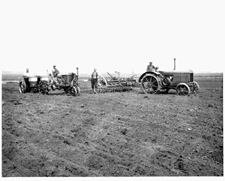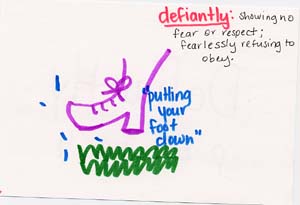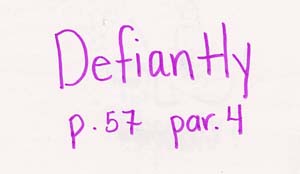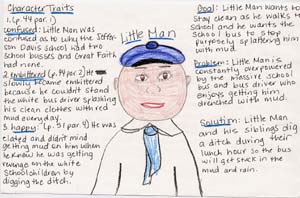Roll of Thunder Hear My Cry
by: Mildred Taylor
Section Two: 32-60

Section Two: 32-60

Your job is to write down questions that your group can talk about.
Be sure to start your questions with words like, Who, What, When, Why,
How, Tell, Where, and Describe.
Characters
1. How does everyone feel about the return of Papa on pages 33 and
34? What are some of the words that the author uses to describe Papa?
(Everyone is excited and overjoyed with Papa's return.
Some words used to describe Papa are, he had a "easy fluid gait" when he
walked ( p. 33 par. 2), he could run like the wind (p.34 par.3), he had
strong hands (p. 34 par. 3), and he was loving to his whole family (p.
34 par.5). )
Problem/Solution
2. On page 40, paragraph 3, Mr. Lanier talks about how the sheriff
would not listen to Henrietta when she tried to talk to him about the burnings
and who had committed the crime. Based on what you have learned so
far about the relationship between whites and blacks during this time,
why do you think the sheriff would not listen to Henrietta? What
could have been a solution to Henrietta's problem? How do you feel
about the his ignoring Henrietta?
(The sheriff would not listen to Henrietta because
he did not care about blacks and he most likely felt that whatever had
happened to the Berrys they probably deserved it because they were black.
White people did not think that black people deserved a right for justice
and they certainly would always take a white person's story over a black
persons. I'm not sure they could be a possible solution for this because
of the way white people thought during this time. The only idea I can think
of would be for the Berry's to move up North to escape the racism and hate.
When I read this part of section two, I was very angry and sad. I
could not believe that the sheriff would not listen and not do anything
about this horrible act that had been done so maliciously. I just
cannot understand the sheriff's point of view in this problem.)
Compare/Contrast
3. The fact that the Logan children could make a ditch in the
road and not be worried about any other cars coming down the road is quite
different from the way our roads are today. Could you make a ditch
in the road today, and if you could, would you be able to leave it and
know that only one car would pass by on that day? As you answer these
questions compare and contrast the differences in the way the roads and
travel were during the 1930's and today.
(I could not make a ditch in the roads today because many of them are paved and I could not use a shovel like the Logan children did to get up concrete! If I did make a ditch like Cassie and the others then there would be no way I could depend on just one car driving down the road. Unlike the rural areas in the 1930's, when only one or two cars were around, in the year 2000 there are tens of thousands of cars and people are always going somewhere and going fast. I could not imagine leaving a ditch for just one school bus from lunch time till the end of school!)
Point of View
Prediction
************************************************************************************************
Section Two: pages 32-60
Your job is to pick passages from this section that you and your group
can talk about. Choose the passages that satisfy the following reasons:
1. ---
2. p. 33 par. 2
3. "She was...beside her"
4. I wrote down this passage because it tells me about what Mama looked
like and because the words are so DESCRIPTIVE and full of imagery
I can see her as if she is standing in front of me!
5. Q. From this passage, and your previous reading in this section,
what lets you know that Mama seemed "dwarfed" beside Big Ma although she
was almost as tall?
A. Mama was tall, but she also was "thin and
sinewy" whereas Big Ma was "tall and strongly built" (p.32 par.2).
So even though Mama was almost as tall as Big Ma she was too thin compared
to Big Ma's big frame.
6. Author's Purpose: TO DESCRIBE
1.---
2. p. 42 par.1
3. "At first...from school"
4. I chose this FIGURATIVE LANGUAGE passage because it gives an example
of personification and I enjoyed the idea of the dust laughing at the rain.
5. Q. What objects are personified in the passage?
A. dust and rain
6.Author's Purpose: TO DESCRIBE
1.---
2. p.41 par.2
3. "Children going...Ya'll hear me?"
4. I chose this passage because I think it is FORESHADOWING that
something bad is going to happen to a child who goes to the Wallace store.
5. Q. Make a prediction now of what character might get in to
trouble at the Wallace store according to your previous reading.
Why did you choose this character, can you give the page and paragraph
number for your assumption?
A. I think that T.J. Avery will be the character
who gets in some kind of trouble because he has already been going up to
the Wallace store. I know this from page 11, paragraph 8. Also
T.J. does not seem to think about rules or consequences, look at the way
he acts towards school!
6. Author's Purpose: TO DESCRIBE
***********************************************************************************************************
Section Two: pages 32-60
1. Write down the word and include the page and paragraph number.
2. Copy the sentence from the book in which the word appears.
3. Look up the word in the dictionary.
4. Using your context clues and the dictionary definition, write
down in your own words the definition of the word.
5. Write down the correct part of speech (noun, verb, adjective,
adverb).
6. Write down a question and the answer about the word that would
help you to teach the word to your group. Try to ask a question about
the word that makes your group refer back to the text. OR you could
write a sentence using the word wizard word.
7. Make your word wizard card. Be sure to include in big print
your word and the page and paragraph number. On the other side of
your card should be a picture, the word, and the definition of the word.
Choose four words from the following:
veered (p.48 par.2) defiantly (p.57 par.4) conspiratorily (p.50 par.2) embittered (p.44 par.2)
splotched (p.42 par.1) resiliency (p.42 par.1)
_____________________________________________________________________________________________________________________________
1. veered (p. 48 par. 2)
2. "Finally when the bus was less than fifty feet behind us, it veered
dangerously close to the right edge of the road where we were running,
forcing us to attempt the jump to the bank; but all of us fell short and
landed in the slime of the gully."
3.---
4. Definition of veered: To change direction suddenly and quickly.
5. verb
6. The cars were going too fast on the highway and so the red car had
to veer to the right heading for the exit lane.
7. (see word wizard card)
1. defiantly (p. 57 par. 4)
2. "Well I am, " Mama said defiantly, smiling smugly to herself
and looking very much like a young girl.
3.---
4.Definition of defiantly: When someone tends to confront or challenge
something
5. adjective
6. I told my mother that I would not go to school that day rather defiantly
by stomping my foot!
7. (see word wizard card)


*******************************************************************************************************
Character Sketcher
Roll Of Thunder Hear My Cry
by Mildred Taylor
Section Two: 32-60
Your job is to find an interesting character from the section you read
today. You will find three words that describe the character.
For each word, or character trait, you will give proof, or example
(don't forget to include the page and paragraph number!). The next
thing you will do is tell one of your character's goals, or what
the character wants to do in this section. Then you will find one
of the character's problems in the section and the solution or
possible solution to the problem.
Finally you get to have fun and illustrate your
character according to the describing words in the book!
________________________________________________________________________________________________

Little Man
******************************************************************************************************
Section Two: 32-60
Your job is to dig up background information on cotton. The information you find will help your group understand the book better. Specific things to look for are:
The role of cotton during the Great Depression:
Links I have found dealing with Cotton:
http://encarta.msn.com/find/Concise.asp?ti=02A24000
http://hammer.ne.mediaone.net/lowell/eli_whitney.html
http://memory.loc.gov/ammem/ammemhome.html